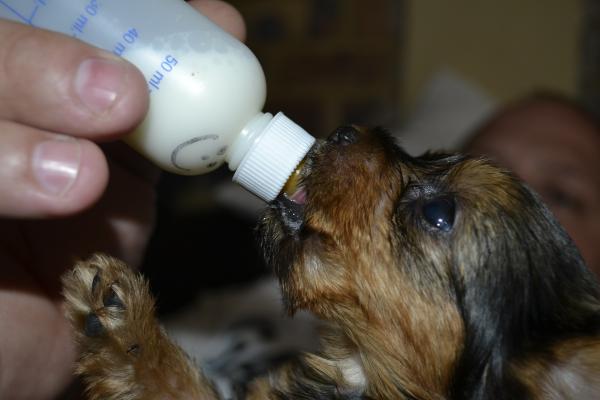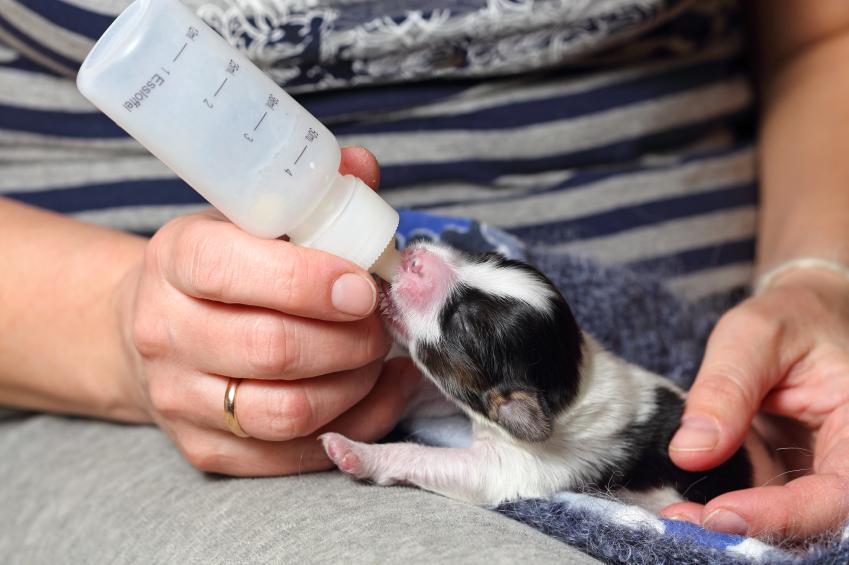Homemade Newborn Puppy Formula



See files for Dogs
At AnimalWised, we are careful to stress the importance of letting a puppy remain with their mother for a minimum of 8 weeks. During this time, the mother is able to look after their needs instinctively. They are helped with defecation, keeping warm and, eventually, socialization. One of the most important aspects is breastfeeding. The mother produces milk for the puppies which not only provides nutrition, but helps to stabilize their immune system. Without the correct nutrition, the puppies are vulnerable to disease, parasitical infestation and many other possible threats to their health.
Unfortunately, there are sometimes unavoidable reasons why a mother cannot look after their puppies. Whether they have died, rejected them or are suffering from a disease themselves, we may need to intervene. This homemade newborn puppy formula can help in an emergency as it best replicates the constitution of their mother's milk.
There is not better milk than breast milk
In all mammal species, a mother's milk is the ideal food for a newborn. Dogs are no different. The little puppies need the nutrients which are naturally formulated by the mother. The act of breastfeeding also helps to reassure the puppy and create an important sense of well-being. Replicating nature's formulae is a notoriously difficult endeavor. At the same time, in an emergency situation, a suitable facsimile is necessary.
The first meal of a puppy will be colostrum. Colostrum is a nutrient and antibody rich form of milk which is designed to give a boost to the puppy's immune system. On the commercial market there are companies which have created their own newborn puppy colostrum formula for this same purpose. They also provide various other feeds and supplements over the course of the dog's life.
Unfortunately, you may find yourself looking after a newborn puppy and these commercial products are not available. You may be in the country, far from the nearest pet store or veterinary clinic. Not all areas will have the same resources, so a homemade newborn puppy formula is necessary.
Some people think you can simply give the puppy cow's milk, but this is not true. The levels of nutrients in a dog's milk are not the same as those in cows. It may work in a pinch, but it can damage their health if used for prolonged periods.
We should also clarify some basic concepts about milk and lactose. Lactose has become worldwide news thanks to the increased cases of food intolerance and allergies. While it will not occur to the same extent, dogs can also suffer from intolerance and allergies. Lactose is a sugar which is found in the milk of all mammals and is vital for good nutrition.
The enzyme lactase is produced in the intestine of puppies which converts lactose into glucose and galactose, vital for the organism's healthy operation. They are essential in providing the energy the puppies need to survive. Production of this enzyme is drastically reduced as the puppy develops into adulthood. This is because it is unnecessary for dogs to continue drinking milk, so their diet changes. The majority of adult dogs are essentially lactose intolerant.
For this reason, we need to respect the weaning process of puppies. Doing so will help bolster their immune system and allow cells in the body to develop properly. It is important to state that commercial products will have a carefully formulated nutrient list designed to meet all of the puppy's needs. This artificial puppy formula to make at home is a temporary solution and should only be used until a better formula is accessed.

Ideal milk formula for puppies
To evaluate and better understand the nutritional needs of a puppy, we can look at the nutritional makeup of their mother's milk.
1 liter of a mother dog's milk will provide between 1,200 and 1,300 kcal and contains the following nutrients:
- 80 g protein
- 90 g fat
- 35 g carbohydrates (lactose)
- 3 g calcium
- 1.8 g phosphorous
Let's compare a liter of dog's milk with the same quantity of industrially produced cow's milk. The cow's milk supplies only 600 kcal and has the following nutrient levels:
- 31 g protein
- 35 g fat (more in ewe's milk)
- 45 g carbohydrates (less in goat's milk)
- 1.3 g calcium
- 0.8 g phosphorous
Looking at the nutritional values of the two formulae, we can see that the composition of cow's milk is half that of dog's milk. If we think we can just double the portion, then it is unfortunately not as simple. The puppies can only stomach so much milk in their small bodies. Getting the right level of nutrients takes a little more effort. We can give some cow's milk in an emergency, but we can cause damage to the puppies if we use it in the long-term.
(Source: Council, N.R.: Nutrient Requirements of Dogs, 1985)

Homemade puppy formula 1 (1,300 kcal/liter)
- 400 ml full fat cow's milk (without lactose)
- 50 ml cream (40% fat)
- 1 egg yolk
- 10 g butter
- 25 g calcium caseinate (milk protein)
Homemade puppy formula 2 (900 kcal/liter)
- 900 ml full fat cow's milk
- 80 ml cream (40% fat)
- 1 egg yolk
Homemade puppy formula 3 (1,100 kcal/liter)
- 850 ml goat's milk
- 150 g mascarpone cheese
Homemade formula 4 (ideal for kittens)
- 250 ml full fat cow's milk (without lactose)
- 150 ml cream (40% fat)
- 1 egg yolk
- 1 tablespoon honey
If the same situations happens with a cat and her kittens, the above formula should work best. Their nutritional needs are similar to that of puppies, but not exactly the same. This is the ideal recipe for homemade kitten formula to replace a mother cat's milk.
How should we feed newborn puppies?
Before we administer the homemade puppy formula to the newborn dogs, it is essential to weigh them. This is ideally done with a kitchen scale as they will be very little. It is difficult to discern the age of a puppy, so we have the following calculation to help us:
- 1st week of life: 12 a 13 kcal/100 g/day
- 2nd week of life: 13 a 15 kcal/100 g/day
- 3rd week of life: 15 a 18 kcal/100 g/day
- 4th week of life: 18 a 20 kcal/100 g/day
To understand the above calculations, we need to get an estimate of a puppy's age. For a test case, we can look at a Golden Retriever weighing 500 g. If we look at their belly, we can see there should be traces of an umbilical cord. We should also see they are crawling and not walking on their own properly. These details mean the puppy is likely in their first week of life and will need 65 kcal per day (13 kcal x 5).
If we are using the first homemade puppy formulae recipe, we can work out that there are 20 x 65 kcal servings in 1 liter. This means each daily serving is 50 ml. A puppy in their first week of life will suckle from their mother about 15 times per day. When feeding artificial formula, we should feed them about 8 times per day or every 3 hours. This means the puppy should get about 6.25 ml of formula from recipe 1 every 3 hours. We can use the above formulae to calculate the amount they need for each week depending on the recipe.
After 4 weeks of life, the weaning process begins and the puppy should move on to a mixture of solid food along with milk supplements. The care and feeding of newborn puppies can be intensive. This is why it is so important to speak to a veterinarian if you find yourself looking after newborn puppies. They will be able to examine the puppies for individual needs and give the best suggestions.

If you want to read similar articles to Homemade Newborn Puppy Formula, we recommend you visit our Lactation category.








